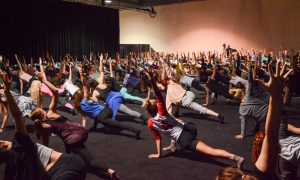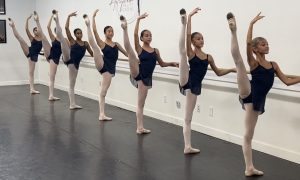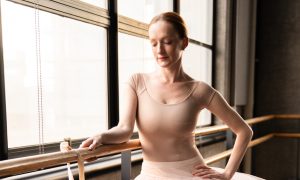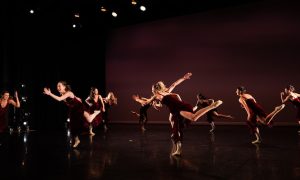Is there actually such a thing as financial freedom, or is that a myth like the Tooth Fairy? Is financial freedom, or even financial stability, a lofty goal that only very few can attain? As “struggling artists”, dancers and dance teachers aren’t known for large pay packets and financial success. But did you know that you can actually have financial freedom or at least healthy control of your finances?
As a sought-after choreographer and now producer, Mandy Moore has had to tackle money matters with the ebbs and flows of the industry for her entire career.
“For me, I always worked many jobs,” Moore reveals. “I love to teach, so working at a local dance studio helped me with my finances and helped me get better at my craft. I learned lots by choreographing at a studio and, in later years, traveling to dance studios around the country. I also said yes to almost any job that came my way. I was never precious about what kind of job or how much money it paid. Many of those contacts grew to be very helpful along the way, which is priceless.”
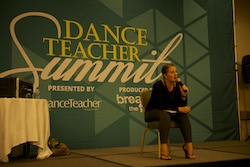
Mandy Moore teaching at Dance Teacher Summit.
Although a mad juggle, Moore believes it’s better to be busy than bored. “I always felt it was better for me to work and not worry about having money, instead of waiting at home for the best job to come around.”
Laney Filuk of Bloc Talent Agency LA adds, “Have a part-time side gig that will always pay your basic bills and give you freedom to train, audition and do gigs. There are a lot of different dance jobs, but some of them work three to five days maximum, so you have to be prepared for inconsistency and lulls. Everyone experiences it, so you have to factor it into your lifestyle and be okay with it.”
And even with a consistent income stream, “success requires planning,” says Misty Lown of More Than Just Great Dancing. “I’m showing my Wisconsin roots by sharing this Vince Lombardi quote, but it goes like this: ‘The man on the top of the mountain didn’t fall there.’ In other words, success is not an accident. It’s a result of preparation, planning and perseverance.”
As the year comes to an end and summer is about to hit, the break is a great time to actually do some financial planning. At this year’s upcoming Dance Teacher Summit, classes will not only concentrate on choreography where you can dance up a storm with the who’s who of the industry, but the business stream will discuss topics like financial freedom and equip dance educators with achievable strategies for both them and their students as they embark on careers in the future.
Lown will show studio owners how to “have a dashboard that monitors all weekly financials. It’s amazing how many problems can be avoided by simply tracking weekly numbers,” she shares.
Let’s be honest now, who is actually tracking their weekly sales, to accounts receivable, to accounts payable?
As a studio owner and studio owner coach, Lown understands the unique pressures of running a dance studio. “There are several challenges that are built into the traditional studio business model, including seasonality of classes, high and low seasons for cash flow, only monthly or quarterly tuition sales but daily bills, forecasting current contracting needs against an unknown future enrollment and more!”
Lown points out that a studio owner’s long-term financial success hinges on two things: “budgeting and cash management. Are you forecasting appropriately to get ahead of rising costs, and what are you going to have to show for your hard work?” she asks.
Filuk shares this same sentiment of “financial reality”, saying, “Assume you’re making 50 percent less than your quoted amount, since that’s the gross amount. Then your net after taxes won’t be such a shock.”
When it comes to paychecks, Lown asks studio owners if they are actually putting themselves “above the line”?

Misty Lown with students.
“Even though it wasn’t a lot in those early years, there was never a year when I wasn’t on payroll because the reality is that if I didn’t (or couldn’t) do my job, someone would have to be paid to do it,” she recounts. “Whatever you do for your studio, whether it is teaching, administration or a combination of the two, that should go on the payroll just like everyone else.”
Looking long-term, Moore explains, “I knew very early that I wouldn’t be able to dance forever and that I wanted a certain lifestyle when I retired. I met with a financial planner and really laid out a game plan for my future. Some of the things I learned made me work harder and save more. It’s important to put money away in your ‘working years’, because jobs come and go and there is no guarantee. Jobs are not always around or frequent. I have had a very good couple of years, but I also know that I am riding a great wave and that wave will have its highs and lows. I need to be prepared for the lows, so I need to have money saved and also be ready to shift my work thinking if jobs aren’t coming my way.”
Her tips for financial freedom revolve around education and understanding. You need to take the time for professional development and business education, whether a dancer, choreographer, teacher or studio owner.
“I think the biggest thing about financial freedom is to really understand money, taxes, hourly wages, fees, agents and contracts,” Moore says. “Sometimes we as artists don’t really look at the money part of it.”
Filuk agrees, saying, “Understand the basics of filing your taxes and when, what you should claim. When you do get a longer-term job, make it a priority to start contributing to an IRA with your banking institution or understand the qualifications of receiving a pension if you’re on a union contract.”
And don’t forget the rewards of hard work.
“I think this business does reward hard work,” says Moore. “I always feel if I put my head down and work, create a professional product, keep evolving and growing, then I will have financial freedom. No tricks, just hard work.”
Want to hear more? The opportunity to gain valuable education about finance and best business practices is this summer at Dance Teacher Summit Long Beach (July 26-28) or New York (August 1-3). For more information about the many business seminars, including Business Boost, visit www.danceteachersummit.com.
By Deborah Searle of Dance Informa.






